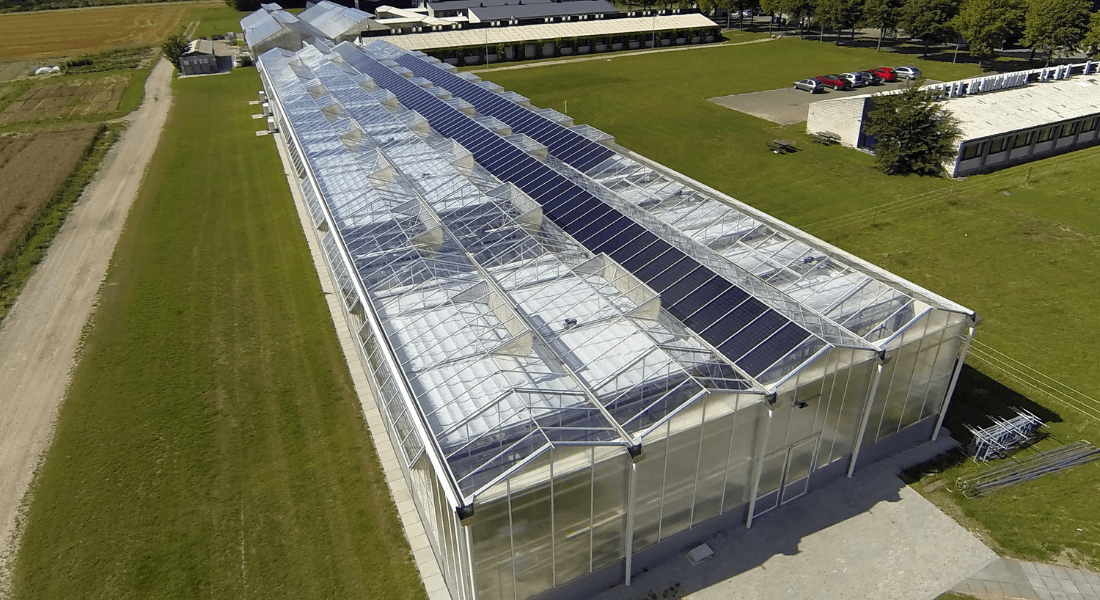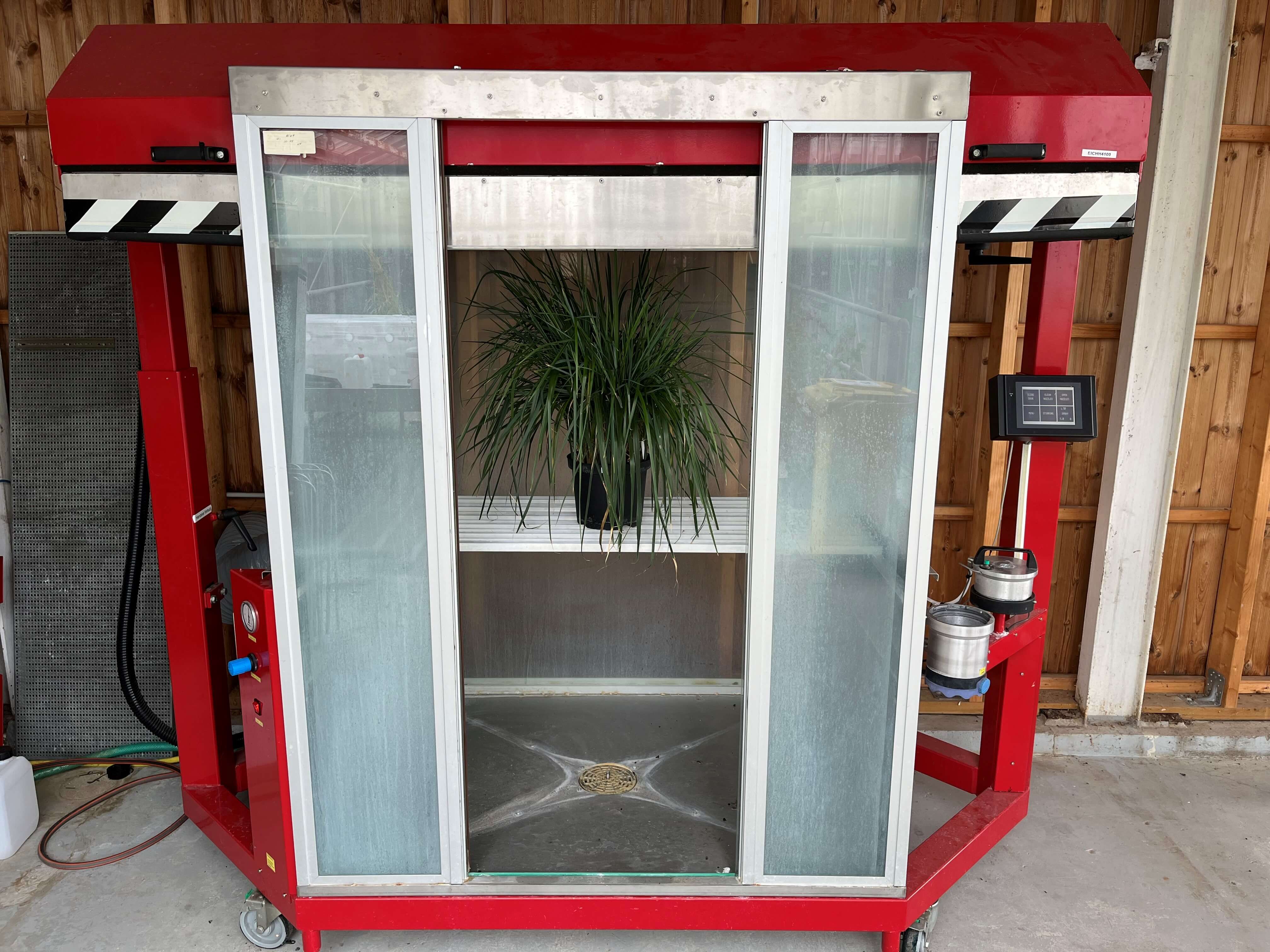Greenhouse Facilities in Taastrup

The greenhouse facilities in Taastrup consist of greenhouses that, in collaboration with the university and external partners, support users with the cultivation and maintenance of plants for research and educational purposes.
The facilities feature a multifunctional greenhouse system and are operated by experienced gardening staff specialized in research-related work.
The greenhouses are classified by the Danish Working Environment Authority and the Environmental Protection Agency for the cultivation of genetically modified organisms and as containment facilities for invasive pests.
Further information about the facilities can be found below.
The greenhouses consist of several units in various sizes. The greenhouses offer:
Irrigation Methods:
- Recirculating
- Drip irrigation
- Manual watering
- Hydroponic
- Sprinkler irrigation
Water Types:
- EC and pH-regulated irrigation for four different types of fertilizer
- Osmosis water
Greenhouse 8-76:
- A standard greenhouse of 300 m² divided into 10 individual cells
Greenhouse 8-79:
- 1,200 m² consisting of 12 cells of 50 m² each, as well as 600 m² technical rooms, buffer zones between cells, workrooms, and corridors
- Glass without iron for better UVB transmission
- Solar panels installed, capable of generating electricity equivalent to the consumption of approx. seven detached houses (approx. 42 mW)
- Recirculating fertilization water with four different recipes
- CO₂ supply
- Full-spectrum LED light with a light intensity of up to 800 μmol/m²/sec
- Humidification/moisture cooling in all cells
- Cells 1-9 and 12: Air cooling via fan coils and cooling compressors
- Cells 6-9: Shade curtains, thermal screens, and blackout curtains
- Cells 6-7: Six weighing cells on one table in each cell
- Cells 10-11: Entry sluices for handling pests and plant pathogens
Greenhouse 8-80:
- A standard greenhouse of 1,200 m² divided into four shared sections
The greenhouses allow for data recording. The following parameters can be recorded per minute:
- Temperature
- Light intensity in μmol/m²/sec
- Light sum
- Humidity measured in Delta X, VPD, and RH%
- CO₂
Additionally, analyses can be obtained on irrigation water and growing substrates (e.g., sphagnum).
PhenoLab can be booked for fully automated, high-capacity phenotyping and includes, among other features:
- 117 fixtures with either 1×13 cm or 4×8 cm pots
- Irrigation based on individual pot weighing
- Vision box equipped with multispectral, thermal, and fluorescence cameras
- Randomization, rotation, and sample collection
It can vary in driving speed, pressure, and nozzle size, allowing for a wide range of application rates (liters per hectare). It is used for experiments and teaching in the use of herbicides, among other applications.

Photo: René Hvidberg Petersen
- Rhizobium rhizogenes-mediated transformation of Rhodiola rosea leaf explants
- Activities of leaf and spike carbohydratemetabolic and antioxidant enzymes are linked with yield performance in three spring wheat genotypes grown under wellwatered and drought conditions
- Achieving sustainable cultivation of ornamental plants
- Elicitation of Flavonoids in Kalanchoe pinnata by Agrobacterium rhizogenes- 22 Mediated Transformation and UV-B Radiation
- Ethephon-induced changes in antioxidants and phenolic compounds in anthocyanin-producing black carrot hairy root cultures
- ABA-mediated regulation of leaf and root hydraulic conductance in tomato grown at elevated CO2 is associated with altered gene expression of aquaporins
- Elevated CO2 modulates the effects of drought and heat stress on plant water relations and grain yield in wheat
- Transformation of Kalanchoë and oilseed rape with ORFs 11-15 from Agrobacterium rhizogenes
The greenhouses are available to all staff and students at the University of Copenhagen, as well as for researchers and educators from other research institutions and companies.
The greenhouse gardeners have extensive experience in plant cultivation, seed germination, experimental setups, and more — expertise that all users of the facilities can benefit from.
We are happy to provide advice during the planning of experiments and are ready to assist with the practical implementation of the experiment or plant cultivation.
Booking information
If you are planning to conduct an experiment, need plant material for teaching, or require assistance from a gardener for research or educational activities, you are welcome to contact us to receive an application form.
We recommend speaking with one of the gardeners before completing the form, so you can get an overview of the available facilities and discuss the planning and practical execution of your experiment.
Inquiries and price estimates
For booking inquiries and project cost estimates, please contact:
Team Leader René Hvidberg Petersen
E-mail: rhvp@plen.ku.dk
Phone: +45 29 61 18 43
If you are instead looking for outdoor field space at the Taastrup site, you can find more information on the page for the Experimental Farms (in Danish).
Contact
Agrovej 12
2630 Taastrup
Find us
General Inquiries
E-mail: greenhouseTAA@plen.ku.dk
Team Leader
René Hvidberg Petersen
Phone: +45 29 61 18 43
E-mail: rhvp@plen.ku.dk
Partners



![]()
Employees
| Name | Title | Phone | |
|---|---|---|---|
| Kenneth Strassenburg Johannsen | Agricultural Technologist | +4593514490 | |
| Mathias Mons Mørch Hansen | Gardener's Labourer FU | +4535325115 | |
| Mattie Frydenlund E Jensen | Gardener FU | +4535337535 | |
| Oliver Westphal Ter-Borch | Gardener Trainee | +4535321199 | |
| René Hvidberg Petersen | Team Manager | +4529611843 | |
| Sarah Zinnia Foged Eriksson Hansen | Gardener FU | +4535322325 | |
| Simone Minor Valentin | Gardener Trainee | +4535329246 |
